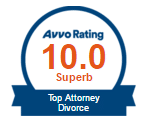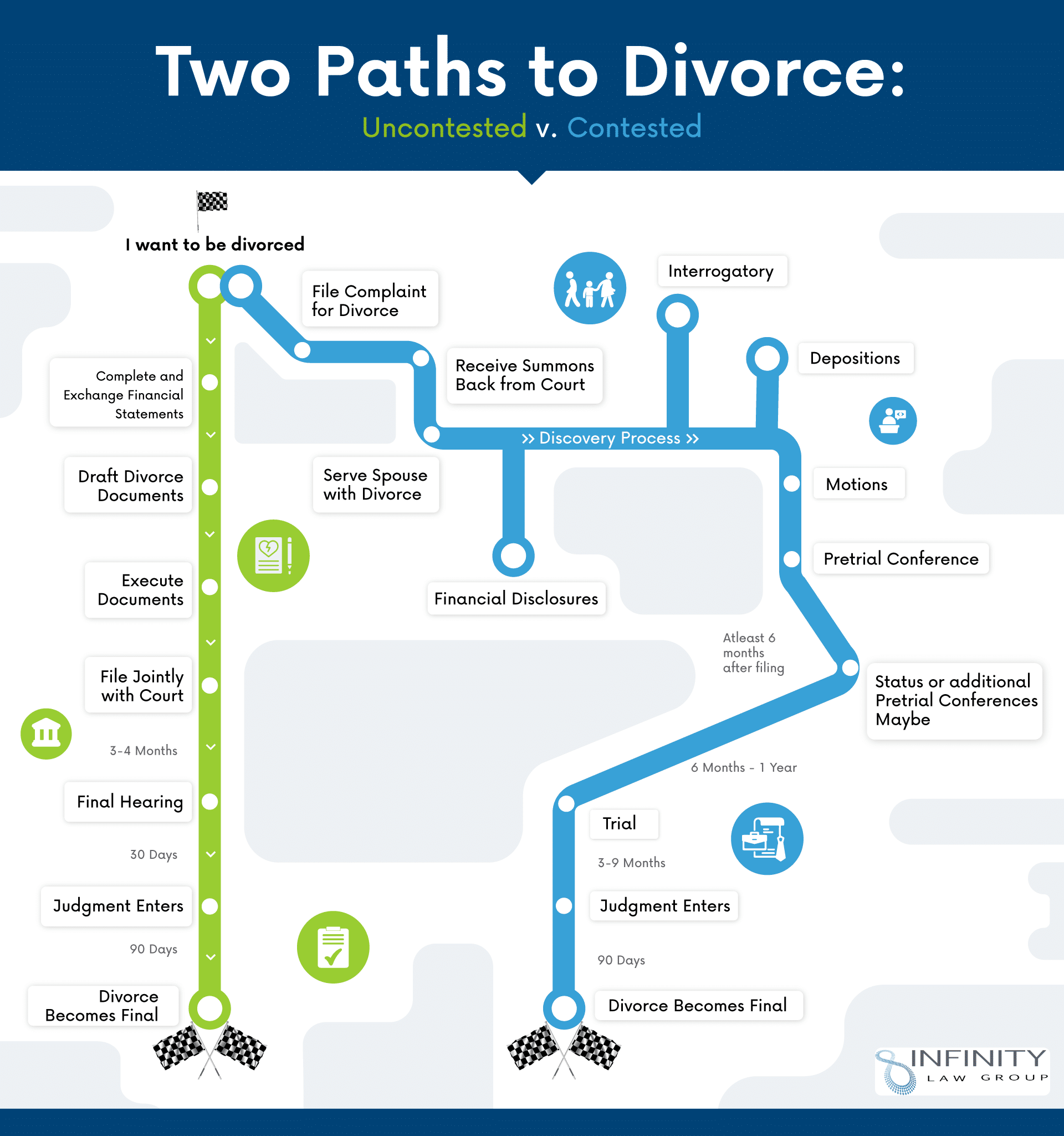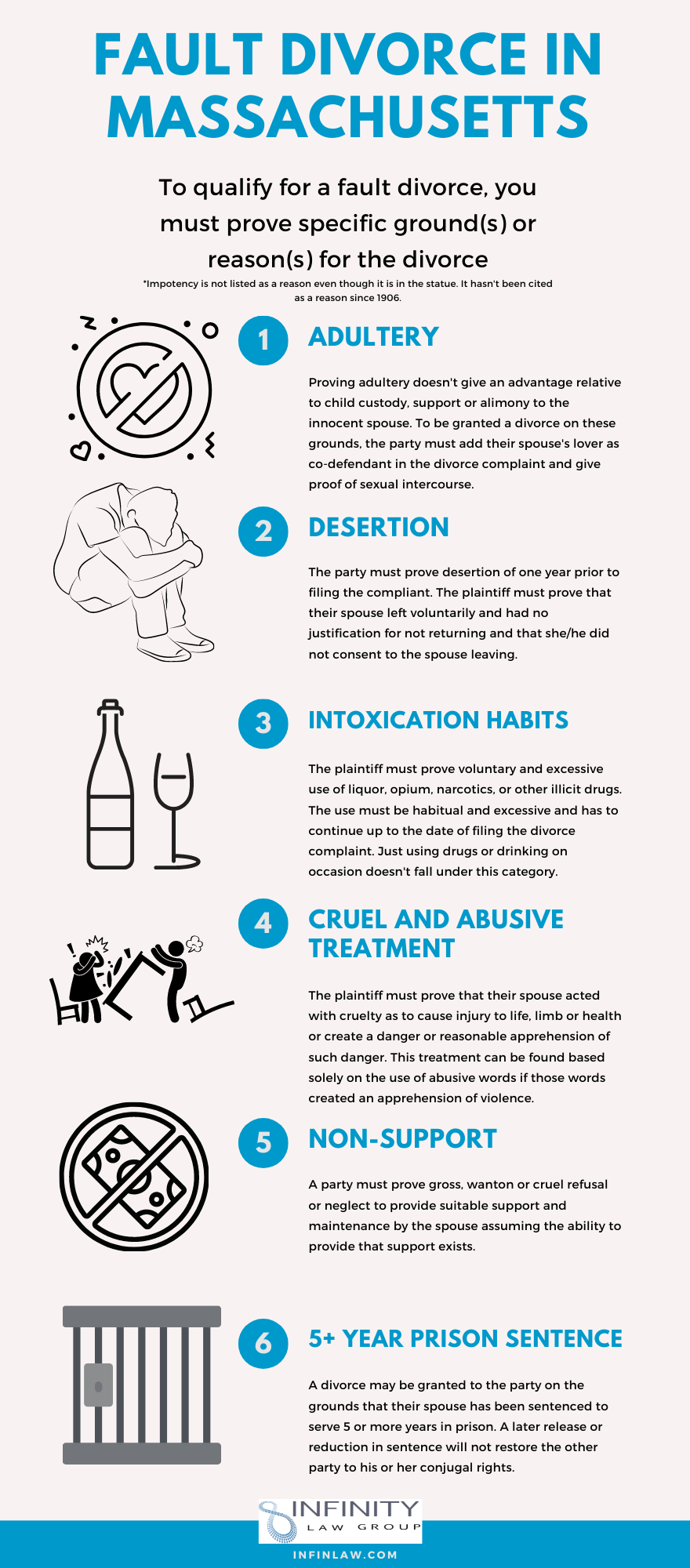Massachusetts Divorce Attorneys
 There is no denying how difficult divorce can be, even when everything goes as planned. The ending of a marriage and the separation of a family, particularly when children are involved, is invariably painful. The fact that you have to jump through so many complicated legal hurdles makes the process even more challenging.
There is no denying how difficult divorce can be, even when everything goes as planned. The ending of a marriage and the separation of a family, particularly when children are involved, is invariably painful. The fact that you have to jump through so many complicated legal hurdles makes the process even more challenging.
At Infinity Law Group, we have helped numerous clients through the divorce process. Our familiarity with Massachusetts divorce laws and our passion for our clients makes us an ideal choice when you need to end your marriage or you need to legally separate from your partner. Our firm will guide you through the entire divorce process, ensuring that the best interests of you and your family are always considered.
Reasons For Divorce
Massachusetts laws allow for both fault-based and no-fault divorces. In a fault-based divorce, you will list the specific reason for the divorce that are accepted as grounds by the state. Some of these grounds include adultery and extreme cruelty.
In a no-fault divorce, you only need to state that the marriage is beyond repair. Most people today choose no-fault divorces because they are usually faster and less expensive than trying to prove fault. They also prevent the need to discuss private matters in the courtroom.
Share this Image On Your Site
Divorce in a Recession
Even as a Massachusetts divorce attorney, recessions have an effect on my practice. During times of financial hardship, I notice that fewer new clients walk through the door. But I wasn’t aware of the startling effect the Great Recession has had on divorce rates generally. A piece by NPR’s All Things Considered informed me that studies have shown that for every one percent increase in the unemployment rate, there is a one percent corresponding drop in the divorce rate.
What’s the Correlation between Recessions and Divorce?
This correlation isn’t due to families “doubling down” and growing closer in the face of adversity, but because couples who would otherwise part ways cannot afford to do so. They cannot afford Court and attorney’s fees, nor do they have the cash on hand to properly divide their estate. The end result is that people who have terminated their relationship are forced to remain married to one another, often under the same roof. For some couples, however, this is an unbearable condition.
Throughout history, divorce rates and rates of domestic violence including homicide have shared a correlation: when divorce rates go up, domestic violence rates go down. The end result of combining all of this information is a frightening picture: when the stressors that make divorce most likely are affecting millions of people, the same root cause places divorce out of reach. These same stressors make domestic violence more likely, and the inability to obtain a divorce or remove oneself from the marital home make domestic violence more difficult to escape.
So what information can I provide those in such a situation?
- You may qualify as an “indigent”, or a person who simply does not have the means to afford the fees associated with divorce. If you do, filing fees and other court costs may be waived. You may also be eligible for free legal advice or representation.
- Divorcing may require you to “liquidate” your assets, or to transfer property from one spouse to the other. You should note that the IRS allows divorcing couples to transfer property between one another without incurring any taxes for such transfers.
- Lastly, you should note that if you and/or your children are being subjected to abuse by your spouse, there are both legal protections and other resources available to you.
There are certainly times when divorce is simply out of the question, but if you or someone you know is placing their physical, emotional, or mental health at risk due to the Great Recession, waiting for the economy to turn around should not be an option.
How To Get A Divorce
The divorce process can be long and tedious, or fairly straightforward, depending on your circumstances. The infographic below illustrates the two primary paths you can take.

Uncontested Divorce
If you and your spouse can agree on all aspects of the divorce, such as how your property will be divided and who will be the custodial parent for your children, you can seek an uncontested divorce. This is often the fastest and least expensive way to get divorced as you do not need to spend time arguing in a courtroom. It is still a good idea to have a lawyer on hand to watch out for any potential pitfalls, but an uncontested divorce is your best option if you want to end your marriage quickly and inexpensively.
Contested Divorce
The term “contested” means that at least one spouse does not agree with at least some terms of the divorce. A contested divorce is quite common, as there are so many terms of a divorce that can have lasting effects on a person’s life. Questions of child custody, child support, spousal support and property division can all lead to disagreements between divorcing spouses.
Our firm always seeks what is best for our clients. If you and your spouse are unable to come to an agreement on any important issues, we will try to work with you, your spouse and your spouse’s attorney to come to terms that everyone can be satisfied with before going before the judge. The more issues that can be resolved outside of the courtroom, the more smoothly your divorce will go.
If not all issues can be resolved, we will continue to be your advocate for as long as it takes to get you favorable terms. We will argue your case effectively in the courtroom without resorting to low blows or questionable tactics. We want your family to remain intact, whatever the final decisions of the court happens to be.
Getting Advice From An Experienced Divorce Lawyer
It may be tempting to complete your divorce papers and submit them to the court all on your own. From the outside, representing yourself can appear less expensive and less difficult than hiring a Massachusetts attorney. But there are so many variables that can come up in a divorce that few people would recommend getting divorced without a lawyer. Anything that goes wrong can have long-term consequences.
Our firm has handled a large number of cases in Massachusetts, making us an excellent resource for all of your questions. We can help you understand how Massachusetts divorce laws handle things like property division, child support, child custody, spousal support, tax deductions and more.
There is a considerable amount of risk involved in self-representation in a divorce, especially if you have anything to lose – like property, assets or children. You are almost always better off with an attorney at your side to look out for your best interests.
Information to Bring to Your Divorce Consultation
You’re ready to get a divorce and you’ve gone as far as setting up a consultation with a Massachusetts divorce attorney. These are a short list of items you should bring with you to your initial consultation with a divorce lawyer. Doing so will make it easier for the attorney to access marital property and give you a good idea as to what you can expect in a divorce settlement.
- Certified copy of marriage license
- Most recent statements from all bank and brokerage accounts
- Most recent statement reflecting all retirement accounts
- Most recent statements of any stocks, bonds, mutual funds, ETFs held outside of brokerage accounts
- Any life insurance policies
- Most recent pay stub
- Copies of tax returns for at least the last 5 years
- Most recent statements from all credit card or debt obligations
- Information regarding any real property, including but not limited to: fair market value of the home (tax accessed value), total mortgage amount, names of people on the mortgage and title
- Information regarding any automobiles and motor vehicles
- Copies of all utility bills include gas, electric, telephone, grocery, etc.
- Any and all financial information regarding your spouse
Order to Vacate
Throughout Massachusetts, Probate Courts may issue orders while your case is pending in order to outline the rights and obligations of the parties. If you and your soon-to-be former spouse are having difficulty determining who is going to stay in your home, you can file with the court for an Order to Vacate.
The Order to Vacate is good for up to 90 days, with the opportunity to renew if the need for the order persists. In order to get the court to issue the order, you must show that without the order, you or your child’s health, safety, or welfare is at risk. If you fear that you are in immediate danger, this order may even be issued immediately without the other party being present at the hearing (though you will need to go back in 5 days rather than 90 under these circumstances.)
The court can even issue this order if the other person has already left the home, or if you have left the home because you feared for your safety and would now like to go back.
How to Choose a Divorce Lawyer
Divorce lawyers are not once-size-fits-all. A divorce lawyer that your neighbor liked and used might not be a good fit for you. So how do you find and evaluate a divorce lawyer?
Finding a divorce lawyer is the easy part. First, look at your circle of friends and family for recommendations. If you are too embarrassed to ask or if you don’t like their suggestions, then there are online resources you can use. I would suggest Google, Avvo.com and Justia.com.
After you have a list of lawyers you want to evaluate, what criteria do you use? I suggest looking at three: quality, personality, and price.
Quality
You evaluate a lawyer’s quality by first talking with them. Call them up and ask them some relevant questions. What is the focus of your practice? Are you a general practice law firm? Have you handled my type of case before?
Do a Google search on that lawyer and their firm. Browse through their website and hopefully they have a blog you can look through as well. Blogs are a great way to get to know a lawyer because it lets you see how they think and how they write. It also should give you information about your situation.
Personality
You’re going to be working with your divorce lawyer for some time so you want one that fits you and your personality. If you’re butting heads with your attorney and trying to get the most from a divorce, you’re fighting two fronts at once.
Generally, you want a divorce lawyer who’s willing to be aggressive but who’s not an aggressive person. You want the lawyer to stand firm but you don’t want them to be unnecessarily aggressive all the time. This is because divorce is mostly about negotiations. An always aggressive person does not generally negotiate well.
Price
Whereas most people look at price first, I would dare to suggest you look at price last. Here’s why.
Hopefully finding a divorce lawyer is a once in a lifetime process. Therefore, do you really want to be bargain shopping for the cheapest lawyer you can find? Probably not. You want a lawyer who satisfies the first two criteria.
Price is of course an issue. If you cannot afford a $300/hr attorney, then you can’t afford them. However, if it’s a decision between a $200/hr attorney and a $250/hr attorney, then I would seriously ignore the price and look carefully at the first two criteria. Also, ask if the lawyer is willing to do fixed price billing or value billing.
Contact Our Attorneys Today
At Infinity Law Group, we offer free phone consultations to all of our clients. If you are considering divorce or legal separation from your spouse, we encourage you to contact us and tell us your story. Even if you do not choose to hire an attorney, the legal advice provided by our firm will help you make informed decisions moving forward. Below is a review from one of our previous clients:
HIGHLY recommend Infinity Law Group.
Gabriel is committed and an expert in his fields – divorce, estate planning, and prenups. His flat-fee billing takes much of the stress out of an already stressful situation. His team is highly responsive and efficient. He has assisted my family several times, always putting their interests first and being an intuitive listener. I have no hesitations recommending Infinity Law Group. – Nicole C.
Please contact us now to schedule your free consultation.
Related Information
 Infinity Law Group LLC
Infinity Law Group LLC






